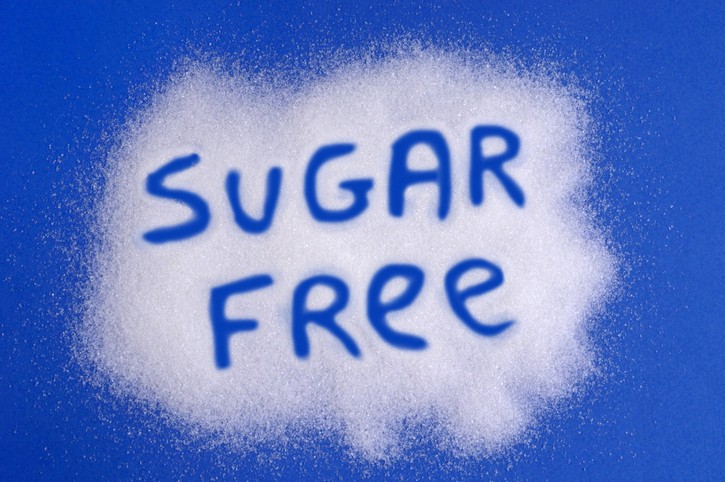Sugar alcohol compared to sugar offers a compelling alternative for those seeking to reduce their sugar intake, and COMPARE.EDU.VN provides an exhaustive comparison to empower informed choices. This guide delves into the nuances of sugar alcohols versus traditional sugars, highlighting their distinct properties and benefits, and examines potential drawbacks, enabling you to make healthier dietary decisions by exploring low-calorie sweeteners and sugar substitutes.
1. What Are Sugar Alcohols and How Do They Differ From Sugar?
Sugar alcohols, also known as polyols, are a class of carbohydrates that are used as sweeteners and bulking agents in a variety of food products. Unlike sugar, they are not fully absorbed by the body, resulting in fewer calories and a lower impact on blood sugar levels.
1.1. Defining Sugar Alcohols
Sugar alcohols are organic compounds that are structurally related to both sugars and alcohols. They occur naturally in some fruits and vegetables, but are often manufactured for commercial use. Common examples include xylitol, erythritol, sorbitol, and mannitol.
1.2. How Sugar Alcohols Differ From Sugar
The key difference between sugar alcohols and sugar lies in how they are metabolized by the body.
- Calorie Content: Sugar alcohols generally have a lower calorie content than sugar. While sugar provides 4 calories per gram, sugar alcohols range from 0 to 3 calories per gram.
- Impact on Blood Sugar: Sugar alcohols are absorbed more slowly and incompletely than sugar, leading to a smaller rise in blood sugar levels. This makes them a popular choice for people with diabetes or those following a low-carbohydrate diet.
- Sweetness Level: The sweetness of sugar alcohols varies. Some, like xylitol, are about as sweet as sugar, while others, like erythritol, are less sweet.
- Digestive Effects: Because sugar alcohols are not fully absorbed, they can cause digestive issues like bloating, gas, and diarrhea, especially when consumed in large quantities.
Image of sugar alcohol crystals against a blue background. The crystals are white and labeled “sugar free.” This represents sugar alcohols as artificial sweeteners.
1.3. Common Types of Sugar Alcohols
Here’s a list of some of the most commonly used sugar alcohols:
- Erythritol: This sugar alcohol is only about 60–80% as sweet as table sugar but contains almost zero calories. This makes it an attractive option for those looking to reduce their caloric intake.
- Xylitol: With a sweetness comparable to sugar, Xylitol is often found in dental products due to its ability to reduce dental cavities. It provides about 2.4 calories per gram.
- Sorbitol: This is about 60% as sweet as sugar and has a slightly bitter aftertaste. It is typically used in sugar-free candies and gums, and it provides about 2.6 calories per gram.
- Mannitol: Often used as a bulking agent, Mannitol is only about 50% as sweet as sugar and is frequently used in powdered food products.
- Maltitol: With about 75% to 90% of the sweetness of sugar, Maltitol is used extensively in chocolates and candies, providing about 2.1 calories per gram.
- Isomalt: A mixture of two sugar alcohols, Isomalt is used for its low impact on blood sugar and is roughly 50% as sweet as sugar. It is frequently seen in decorative confectionery.
- Lactitol: Approximately 30-40% as sweet as sucrose, it’s used for its low calorie content and its stability, often incorporated into baked goods and confectioneries.
1.4. How to Identify Sugar Alcohols on Food Labels
Sugar alcohols are required to be listed on the nutrition labels of food products. They are typically identified by their specific names (e.g., xylitol, sorbitol) or under the general category of “sugar alcohols.”
2. What Are the Benefits of Using Sugar Alcohols Instead of Sugar?
Sugar alcohols offer several potential health benefits when used as a substitute for sugar.
2.1. Lower Calorie Content
One of the primary advantages of sugar alcohols is their reduced calorie content compared to sugar. This can be beneficial for weight management and reducing overall caloric intake.
2.2. Reduced Impact on Blood Sugar Levels
Sugar alcohols have a minimal effect on blood sugar levels, making them a suitable option for individuals with diabetes or insulin resistance. They do not cause the rapid spikes in blood glucose that can occur with sugar consumption.
2.3. Dental Health Benefits
Some sugar alcohols, like xylitol, have been shown to have dental health benefits. Xylitol can inhibit the growth of bacteria in the mouth, reducing the risk of tooth decay and cavities.
2.4. Versatile Sweetening Option
Sugar alcohols can be used in a wide range of food and beverage products, providing a versatile sweetening option for manufacturers and consumers alike.
3. What Are the Potential Drawbacks of Sugar Alcohols?
While sugar alcohols offer several advantages, they also have potential drawbacks that should be considered.
3.1. Digestive Issues
The most common side effect of sugar alcohol consumption is digestive discomfort. Because they are not fully absorbed, sugar alcohols can draw water into the intestines and ferment in the colon, leading to gas, bloating, diarrhea, and abdominal pain.
3.2. Not Suitable for Everyone
Individuals with sensitive digestive systems or certain medical conditions may need to limit or avoid sugar alcohols altogether. People with irritable bowel syndrome (IBS) or fructose malabsorption may be particularly susceptible to digestive issues.
3.3. Potential for Overconsumption
Because sugar alcohols are often found in “sugar-free” or “low-carb” products, there is a risk of overconsumption. Eating excessive amounts of these products can lead to unwanted side effects.
3.4. Variable Sweetness Levels
The sweetness of sugar alcohols varies, and some are less sweet than sugar. This can be a drawback for those who prefer a strong sweet taste.
4. How Do Sugar Alcohols Compare to Other Sugar Substitutes?
Sugar alcohols are just one type of sugar substitute available on the market. Here’s a comparison to other common alternatives:
4.1. Artificial Sweeteners
Artificial sweeteners, such as aspartame, sucralose, and saccharin, are synthetic compounds that provide intense sweetness without the calories. Unlike sugar alcohols, they are fully absorbed by the body and do not typically cause digestive issues. However, some people may experience side effects like headaches or allergic reactions. Concerns have also been raised about the long-term health effects of artificial sweeteners.
4.2. Natural Sweeteners
Natural sweeteners, like stevia and monk fruit, are derived from plants and offer a calorie-free or low-calorie sweetening option. They have a minimal impact on blood sugar levels and are generally well-tolerated. However, some people may find their taste to be slightly different from sugar.
4.3. Comparing Sweeteners: A Table
| Sweetener | Calories per Gram | Impact on Blood Sugar | Potential Side Effects |
|---|---|---|---|
| Sugar | 4 | High | Weight gain, tooth decay, increased risk of chronic diseases |
| Sugar Alcohols | 0-3 | Low | Digestive issues, gas, bloating |
| Artificial Sweeteners | 0 | None | Possible headaches, allergic reactions |
| Natural Sweeteners | 0-0.3 | Low | Generally well-tolerated |


5. What Are the Recommendations for Consuming Sugar Alcohols?
If you choose to include sugar alcohols in your diet, it’s important to do so in moderation and be mindful of potential side effects.
5.1. Start Slowly
If you’re new to sugar alcohols, start with small amounts to assess your tolerance. Gradually increase your intake as needed, while monitoring for any digestive discomfort.
5.2. Read Labels Carefully
Pay attention to the nutrition labels of food products and be aware of the amount of sugar alcohols they contain. Avoid consuming excessive amounts of products that are high in sugar alcohols.
5.3. Choose the Right Type
Different sugar alcohols have different effects on the body. Some people may tolerate certain types better than others. Experiment with different sugar alcohols to find the ones that work best for you.
5.4. Stay Hydrated
Sugar alcohols can draw water into the intestines, so it’s important to drink plenty of fluids to stay hydrated.
5.5. Consult With a Healthcare Professional
If you have any concerns about consuming sugar alcohols, or if you have a medical condition that may be affected by their consumption, consult with a healthcare professional or registered dietitian.
6. How Can People With Diabetes Use Sugar Alcohols Safely?
For people with diabetes, sugar alcohols can be a useful tool for managing blood sugar levels and reducing sugar intake. However, it’s important to use them safely and effectively.
6.1. Monitor Blood Sugar Levels
Regularly monitor your blood sugar levels to see how sugar alcohols affect you. This will help you determine the appropriate amount to consume and whether they are a suitable option for your individual needs.
6.2. Choose Products Wisely
Select products that are specifically labeled as “sugar-free” or “diabetic-friendly.” Be sure to read the nutrition labels carefully and be aware of the total carbohydrate content of the product.
6.3. Consider the Glycemic Index
The glycemic index (GI) is a measure of how quickly a food raises blood sugar levels. Choose sugar alcohols with a low GI, such as erythritol and xylitol, to minimize their impact on blood sugar.
6.4. Don’t Overdo It
Even though sugar alcohols have a lower impact on blood sugar than sugar, it’s still important to consume them in moderation. Excessive amounts can lead to digestive issues and may still have some effect on blood sugar levels.
6.5. Work With a Healthcare Team
Collaborate with your healthcare team, including your doctor, registered dietitian, and certified diabetes educator, to develop a personalized plan for using sugar alcohols safely and effectively.
7. What Research Says About the Health Effects of Sugar Alcohols?
The health effects of sugar alcohols have been the subject of numerous scientific studies. Here’s a summary of what the research says:
7.1. Impact on Weight Management
Studies have shown that sugar alcohols can be a useful tool for weight management. By reducing calorie intake and promoting satiety, they can help people lose weight or maintain a healthy weight.
7.2. Effects on Blood Sugar Control
Research has confirmed that sugar alcohols have a minimal impact on blood sugar levels. They do not cause the rapid spikes in blood glucose that can occur with sugar consumption, making them a suitable option for people with diabetes.
7.3. Dental Health Benefits
Xylitol, in particular, has been shown to have dental health benefits. Studies have found that it can inhibit the growth of bacteria in the mouth, reduce the risk of tooth decay and cavities, and promote the remineralization of tooth enamel.
7.4. Digestive Effects
The digestive effects of sugar alcohols are well-documented. Studies have confirmed that excessive consumption can lead to digestive issues like gas, bloating, diarrhea, and abdominal pain.
7.5. Long-Term Health Effects
The long-term health effects of sugar alcohols are still being investigated. Some studies have raised concerns about their potential impact on cardiovascular health, but more research is needed to confirm these findings.
8. What Are Some Creative Ways to Use Sugar Alcohols in Cooking and Baking?
Sugar alcohols can be used in a variety of creative ways in cooking and baking. Here are some ideas:
8.1. Sweeten Beverages
Use sugar alcohols like erythritol or xylitol to sweeten coffee, tea, smoothies, and other beverages.
8.2. Make Sugar-Free Desserts
Create sugar-free versions of your favorite desserts, such as cookies, cakes, pies, and ice cream, using sugar alcohols as a sugar substitute.
8.3. Create Homemade Sauces and Dressings
Use sugar alcohols to make homemade sauces and dressings, such as ketchup, barbecue sauce, and salad dressing.
8.4. Sweeten Yogurt and Oatmeal
Add sugar alcohols to yogurt and oatmeal for a touch of sweetness without the calories.
8.5. Make Sugar-Free Candies
Create your own sugar-free candies using sugar alcohols as a sweetener.
9. What Are Some Common Myths and Misconceptions About Sugar Alcohols?
There are several myths and misconceptions surrounding sugar alcohols. Let’s debunk some of the most common ones:
9.1. Myth: Sugar Alcohols Are Completely Calorie-Free
While some sugar alcohols, like erythritol, are nearly calorie-free, others contain a small amount of calories (0-3 calories per gram).
9.2. Myth: Sugar Alcohols Are Completely Safe for Everyone
Sugar alcohols can cause digestive issues in some people, particularly when consumed in large quantities.
9.3. Myth: Sugar Alcohols Are Just as Bad as Sugar
Sugar alcohols have a lower impact on blood sugar levels and are less likely to contribute to weight gain than sugar.
9.4. Myth: Sugar Alcohols Are Artificial Sweeteners
Sugar alcohols are not artificial sweeteners. They are a type of carbohydrate that occurs naturally in some fruits and vegetables.
9.5. Myth: All Sugar Alcohols Are the Same
Different sugar alcohols have different properties and effects on the body. Some are sweeter than others, and some are more likely to cause digestive issues.
10. What the Future Holds for Sugar Alcohols: Trends and Innovations
The future of sugar alcohols looks promising, with several trends and innovations on the horizon.
10.1. Increased Demand
As more people become aware of the health risks associated with sugar consumption, the demand for sugar substitutes like sugar alcohols is expected to increase.
10.2. New Sugar Alcohol Varieties
Researchers are constantly exploring new sugar alcohol varieties with improved taste, texture, and health benefits.
10.3. Improved Manufacturing Processes
Manufacturers are working to develop more efficient and sustainable processes for producing sugar alcohols.
10.4. Combination Products
Some companies are combining sugar alcohols with other sweeteners, such as stevia or monk fruit, to create products with a more balanced taste profile.
10.5. Enhanced Education and Awareness
Increased education and awareness about sugar alcohols can help people make informed choices about their use and avoid potential side effects.
FAQ: Your Questions About Sugar Alcohols Answered
Here are some frequently asked questions about sugar alcohols:
1. Are sugar alcohols safe for children?
Sugar alcohols are generally considered safe for children, but they should be consumed in moderation to avoid digestive issues.
2. Can sugar alcohols cause weight gain?
Sugar alcohols are less likely to contribute to weight gain than sugar because they contain fewer calories and have a minimal impact on blood sugar levels.
3. Are sugar alcohols bad for your teeth?
Some sugar alcohols, like xylitol, can actually benefit dental health by inhibiting the growth of bacteria in the mouth.
4. Can sugar alcohols cause allergic reactions?
Allergic reactions to sugar alcohols are rare, but they can occur in some people.
5. Are sugar alcohols safe during pregnancy and breastfeeding?
Sugar alcohols are generally considered safe during pregnancy and breastfeeding, but it’s always best to consult with a healthcare professional before making any dietary changes.
6. What is the acceptable daily intake of sugar alcohols?
There is no official acceptable daily intake (ADI) for sugar alcohols. However, it’s generally recommended to consume them in moderation to avoid digestive issues.
7. How do sugar alcohols affect gut health?
Sugar alcohols can have both positive and negative effects on gut health. While they can promote the growth of beneficial bacteria in the gut, they can also cause digestive issues like gas and bloating.
8. Are sugar alcohols suitable for people with IBS?
People with IBS may be more sensitive to the digestive effects of sugar alcohols. It’s best to limit or avoid them if they cause symptoms.
9. Can sugar alcohols be used in pet food?
Some sugar alcohols, like xylitol, are toxic to dogs and should not be used in pet food.
10. Where can I find more information about sugar alcohols?
You can find more information about sugar alcohols from reputable sources like the Food and Drug Administration (FDA), the American Diabetes Association (ADA), and registered dietitians.
Sugar alcohols can be a useful tool for reducing sugar intake and managing blood sugar levels, but they are not a magic bullet. It’s important to consume them in moderation, be mindful of potential side effects, and consult with a healthcare professional if you have any concerns.
Are you struggling to compare different sweeteners and make informed choices? Visit COMPARE.EDU.VN today to access detailed comparisons, expert reviews, and user feedback, empowering you to make the best decisions for your health and lifestyle. Navigate the world of sweeteners with confidence and discover the perfect balance for your dietary needs.
Address: 333 Comparison Plaza, Choice City, CA 90210, United States. Whatsapp: +1 (626) 555-9090. Website: compare.edu.vn
